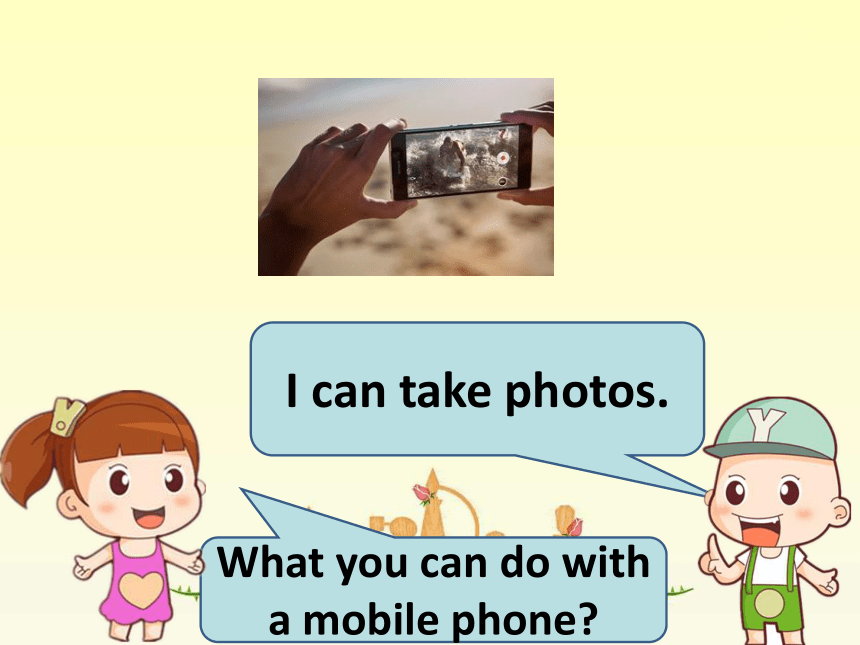Unit 1 A phone call 课件 (共34张PPT)
文档属性
| 名称 | Unit 1 A phone call 课件 (共34张PPT) |

|
|
| 格式 | zip | ||
| 文件大小 | 2.4MB | ||
| 资源类型 | 教案 | ||
| 版本资源 | 外研版(刘兆义主编) | ||
| 科目 | 英语 | ||
| 更新时间 | 2019-02-03 00:00:00 | ||
图片预览












文档简介
课件34张PPT。 Unit 1
A phone callTALKS
与身边的同学讨论一下,手机有哪些功能?phrasesmake phone callssee filmstake photosget messagesRole PlayI can take photos.What you can do with a mobile phone?I can see films.What you can do with a mobile phone?I can make phone calls.What you can do with a mobile phone?I can get messages.What you can do with a mobile phone?I can watch TV programmes.What you can do with a mobile phone?Grammar puzzle
I _____(have/has) to ask Mum first.
My father ____(collect/collects)stamps.
Grammar puzzle
Her parents_____(love/loves)music and art.
Philip ____(have to /has to) get up before 7:OO.
Grammar puzzle
1. She___(like) English very much.
2. He____(read) many English story books.
3. My cousin___(work) hard at English.
Answerhave
collects
love
has to
likes
reads
workshave用法Do you have a ruler, lion?Yes, I do.一般现在时态中have的用法
1.--Do you have a ping-pong bat ?
--Yes,I do.
2.---Does he have a soccer ball ?
----Yes,he does.
3.I don't have a soccer ball.
have有表示所属关系,有人称和数的变化,主语有时也可以是物。1.have用于复数名词,第一、第二人称单复数或第三人称复数代词作主语的句子中。
has为have的第三人称单数形式,用于不可数名词、可数名词单数或第三人称单数代词作主语的句子中。
People have their own rooms.
Jack has three pens.
2.have /has 作谓语时的句型转换。
(1)否定句:主语+don't/doesn't +have ...
I don't have an eraser.
He doesn't have a tennis racket.
(2) 一般疑问句式:
Do/Does + 主语 + have ...?
--Do you have a bike ?
--Yes,I do /No,I don't.
--Does he have a soccer ?
--Yes,he does./No,he doesn't.
3.在英国英语中常用have/has got表示有,拥有,占有,变一般疑问句和否定句时不再借助于助动词do和does。
I've got a computer.
→I haven't got a computer.
→Have you got a computer ?
4.have/has 的含义相当多,表示“吃、喝”等,还可以构成许多常用的短语,其后跟不同的名词作宾语时,其本身含义也随之发生变化。
have lunch 吃午饭
have a look 看一看
have a glass of milk 喝杯牛奶
have a party 举行晚会
have a good time/have a good day/have
fun 玩得开心
have a rest 休息一下
have to用法have to
表示“不得不”、“必须”。在肯定句中, have to 随人称和时态的不同而变化。其否定式和疑问式 的构成形式与行为动词have相同,即需使用助动词。
e.g 1). It’s too late. I have to walk home.
2). They don’t have to finish the work today.
3). He had to leave early yesterday.
4). Did he have to leave early yesterday?have to 的第三人称单数形式是:
has to
He/ She/ It/Tom/ My father/ has to
have to 和has to 的过去式:had to否定:
have to---- don’t have to
has to --- doesn’t have to
had to --- didn’t have to
都表示 “不必”
must意思为“必须……,得……,要……”;
肯定式:must + V原;
否定式:must + not + V原;
疑问式:Must + 主语……?
e.g 1). You must go home now.
2). You mustn’t smoke here.
3). Must I finish English course this term?由must引起的疑问句,肯定回答要用must或have to,否定回答要用needn’t或don’t have to,意思是“不必”;
must 与have to 的区别
异:♀must多表示主观意志,是从说话人的角度出发谈必 须做某事。而have to强调客观需要。
e.g. A. I must finish my homework today.
B. I have to finish my homework before
lunchtime.
♀二者否定式的意义大不相同。have to 的否定式表示“不必”,而must not/mustn’t表示“不准”。
e.g. A. I don’t have to finish my homework now.
B. You mustn’t arrive late or you’ll get
into trouble.
♀must没有时态变化,而have to 可有不同的时态变化。
e.g. 1).We will have to leave tomorrow.
2).Tom had to finish his work yesterday.
一、请用must, need或have to的适当形式填空。
1. I’ll _________ look after my sister at home this Sunday.
2. You _________ go outside to play as it is snowing heavily.
3. We ________ be polite to our teachers at school. Practice have tomustn’tmust4. I got up late this morning, so I _____ take a taxi to school.
5. —Does she _________ stay at home? ????—No, she doesn’t.
6. —Must I get to the station before 5 p.m.?
—Yes, you _______. / No, you _______________________. had tohave tomustdon’t have to / needn’tHomework写一篇关于手机功能的英文介绍。THANK YOU !
A phone callTALKS
与身边的同学讨论一下,手机有哪些功能?phrasesmake phone callssee filmstake photosget messagesRole PlayI can take photos.What you can do with a mobile phone?I can see films.What you can do with a mobile phone?I can make phone calls.What you can do with a mobile phone?I can get messages.What you can do with a mobile phone?I can watch TV programmes.What you can do with a mobile phone?Grammar puzzle
I _____(have/has) to ask Mum first.
My father ____(collect/collects)stamps.
Grammar puzzle
Her parents_____(love/loves)music and art.
Philip ____(have to /has to) get up before 7:OO.
Grammar puzzle
1. She___(like) English very much.
2. He____(read) many English story books.
3. My cousin___(work) hard at English.
Answerhave
collects
love
has to
likes
reads
workshave用法Do you have a ruler, lion?Yes, I do.一般现在时态中have的用法
1.--Do you have a ping-pong bat ?
--Yes,I do.
2.---Does he have a soccer ball ?
----Yes,he does.
3.I don't have a soccer ball.
have有表示所属关系,有人称和数的变化,主语有时也可以是物。1.have用于复数名词,第一、第二人称单复数或第三人称复数代词作主语的句子中。
has为have的第三人称单数形式,用于不可数名词、可数名词单数或第三人称单数代词作主语的句子中。
People have their own rooms.
Jack has three pens.
2.have /has 作谓语时的句型转换。
(1)否定句:主语+don't/doesn't +have ...
I don't have an eraser.
He doesn't have a tennis racket.
(2) 一般疑问句式:
Do/Does + 主语 + have ...?
--Do you have a bike ?
--Yes,I do /No,I don't.
--Does he have a soccer ?
--Yes,he does./No,he doesn't.
3.在英国英语中常用have/has got表示有,拥有,占有,变一般疑问句和否定句时不再借助于助动词do和does。
I've got a computer.
→I haven't got a computer.
→Have you got a computer ?
4.have/has 的含义相当多,表示“吃、喝”等,还可以构成许多常用的短语,其后跟不同的名词作宾语时,其本身含义也随之发生变化。
have lunch 吃午饭
have a look 看一看
have a glass of milk 喝杯牛奶
have a party 举行晚会
have a good time/have a good day/have
fun 玩得开心
have a rest 休息一下
have to用法have to
表示“不得不”、“必须”。在肯定句中, have to 随人称和时态的不同而变化。其否定式和疑问式 的构成形式与行为动词have相同,即需使用助动词。
e.g 1). It’s too late. I have to walk home.
2). They don’t have to finish the work today.
3). He had to leave early yesterday.
4). Did he have to leave early yesterday?have to 的第三人称单数形式是:
has to
He/ She/ It/Tom/ My father/ has to
have to 和has to 的过去式:had to否定:
have to---- don’t have to
has to --- doesn’t have to
had to --- didn’t have to
都表示 “不必”
must意思为“必须……,得……,要……”;
肯定式:must + V原;
否定式:must + not + V原;
疑问式:Must + 主语……?
e.g 1). You must go home now.
2). You mustn’t smoke here.
3). Must I finish English course this term?由must引起的疑问句,肯定回答要用must或have to,否定回答要用needn’t或don’t have to,意思是“不必”;
must 与have to 的区别
异:♀must多表示主观意志,是从说话人的角度出发谈必 须做某事。而have to强调客观需要。
e.g. A. I must finish my homework today.
B. I have to finish my homework before
lunchtime.
♀二者否定式的意义大不相同。have to 的否定式表示“不必”,而must not/mustn’t表示“不准”。
e.g. A. I don’t have to finish my homework now.
B. You mustn’t arrive late or you’ll get
into trouble.
♀must没有时态变化,而have to 可有不同的时态变化。
e.g. 1).We will have to leave tomorrow.
2).Tom had to finish his work yesterday.
一、请用must, need或have to的适当形式填空。
1. I’ll _________ look after my sister at home this Sunday.
2. You _________ go outside to play as it is snowing heavily.
3. We ________ be polite to our teachers at school. Practice have tomustn’tmust4. I got up late this morning, so I _____ take a taxi to school.
5. —Does she _________ stay at home? ????—No, she doesn’t.
6. —Must I get to the station before 5 p.m.?
—Yes, you _______. / No, you _______________________. had tohave tomustdon’t have to / needn’tHomework写一篇关于手机功能的英文介绍。THANK YOU !
